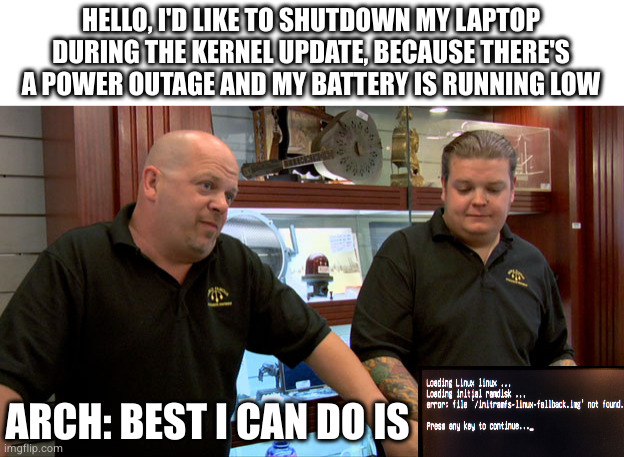this post was submitted on 04 Aug 2024
321 points (87.9% liked)
linuxmemes
20880 readers
3 users here now
I use Arch btw
Sister communities:
- LemmyMemes: Memes
- LemmyShitpost: Anything and everything goes.
- RISA: Star Trek memes and shitposts
Community rules
- Follow the site-wide rules and code of conduct
- Be civil
- Post Linux-related content
- No recent reposts
Please report posts and comments that break these rules!
founded 1 year ago
MODERATORS
you are viewing a single comment's thread
view the rest of the comments
view the rest of the comments

Out of curiosity: Which operating system(s) can you shutdown while the kernel is being overwritten? I wouldn't imagine that as a limitation of Arch Linux specifically.
I think fedora would survive this abuse. It doesn't replace when you install kernels, but instead adds it.
Also Fedora ships 3 kernels by default. If one breaks, maybe the others will keep working.
With Manjaro you choose how much kernels you want.
Arch let's you install kernels till /boot is full...
Yes. I have it set up this way. I forgot it wasn't the default. For the amount of headache it would solve, I wonder if the Arch team has a specific reason for not keeping a number of previous kernels by default.
Ubuntu (and probably Debian too) will keep an old kernel in your grub list so you can boot off that one if needed.
Arch Linux with 2 kernels ;)
Mint definitely keeps a couple of previous kernels around, so that might be a Debian and Ubuntu thing too.
That said, there's always going to be a critical point of failure that a power loss could cause things to break, no matter your OS or distro.
Writing the bootloader or updating a partition table for example.
Anything running on a copy-on-write filesystem can trivially rollback changes using a rescue partition.
I also expect most immutable distros would be able to be especially good at tanking this.
I assume NixOs would just let you load a previous working configuration if the current one got corrupted (though in this case it probably could simply rebuild the current one).
Windows
Goes back to a previous restore point
I haven't used Windows since Win7 - Is it possible nowadays to immediately cancel a kernel-level upgrade (say, Win7 to Win8) and have it gracefully stop and then boot into the pre-upgrade environment? If so, then Windows has come a long way. We use to be careful breathing-too-loudly around Windows computers during the upgrade process. Microsoft must be getting better.